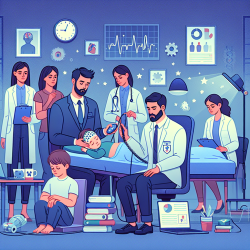Introduction
In the realm of pediatric care, the challenges are as diverse as the children we serve. From behavioral issues to developmental concerns, the spectrum of needs is vast. The recent research article, "Behavioral Pediatrics: A Team-Based Interprofessional Approach," underscores the importance of integrating diverse professional expertise to enhance pediatric care outcomes. This blog post delves into how practitioners can leverage these insights to improve their skills and outcomes in pediatric care.
The Power of Interprofessional Collaboration
The research highlights the significant benefits of an interprofessional approach in pediatric behavioral care. By fostering collaboration among professionals from medicine, psychology, and social work, practitioners can address the multifaceted needs of pediatric patients more effectively. This team-based approach not only improves the quality of care but also enhances patient and provider satisfaction.
Implementing Interprofessional Education
East Tennessee State University (ETSU) has pioneered an interprofessional course that brings together students from various disciplines to learn and practice collaborative care. The course focuses on:
- Reinforcing the importance of multidisciplinary collaboration.
- Sharing clinical techniques and skills in a simulated interprofessional setting.
- Practicing collaboration within interprofessional teams.
By simulating real-world scenarios, students gain hands-on experience in working as part of a team, which is crucial for addressing complex pediatric issues.
Key Outcomes and Benefits
The course has demonstrated several positive outcomes, including:
- Improved access to and quality of behavioral healthcare.
- Enhanced behavioral health outcomes for pediatric patients.
- Decreased cost of care and increased provider satisfaction.
Moreover, this approach aligns with the Primary Care Medical Home model and the Quadruple Aim in healthcare, which focuses on improving patient experience, reducing costs, addressing population health needs, and enhancing provider job satisfaction.
Encouraging Further Research and Implementation
For practitioners looking to enhance their skills, embracing interprofessional education and collaboration is a step in the right direction. Engaging in further research and implementing team-based approaches in clinical practice can lead to better outcomes for children. Practitioners are encouraged to explore opportunities for collaboration and to advocate for integrated care models within their organizations.
Conclusion
The research presented in "Behavioral Pediatrics: A Team-Based Interprofessional Approach" offers valuable insights into the benefits of interprofessional collaboration in pediatric care. By embracing these strategies, practitioners can improve their skills and contribute to better outcomes for the children they serve. To read the original research paper, please follow this link: Behavioral Pediatrics: A Team-Based Interprofessional Approach.










